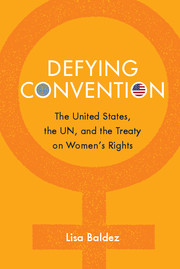Book contents
- Frontmatter
- Dedication
- Contents
- Acknowledgments
- 1 Introduction
- 2 A Scaffolding for Global Women’s Rights, 1945–1970
- 3 Geopolitics and Drafting the UN Treaty on Women’s Rights
- 4 An Evolving Global Norm of Women’s Rights
- 5 CEDAW Impact: Process, Not Policy
- 6 Why the United States Has Not Ratified CEDAW
- 7 CEDAW and Domestic Violence Law in the United States
- 8 Conclusion
- Works Cited
- Index
6 - Why the United States Has Not Ratified CEDAW
Published online by Cambridge University Press: 05 August 2014
- Frontmatter
- Dedication
- Contents
- Acknowledgments
- 1 Introduction
- 2 A Scaffolding for Global Women’s Rights, 1945–1970
- 3 Geopolitics and Drafting the UN Treaty on Women’s Rights
- 4 An Evolving Global Norm of Women’s Rights
- 5 CEDAW Impact: Process, Not Policy
- 6 Why the United States Has Not Ratified CEDAW
- 7 CEDAW and Domestic Violence Law in the United States
- 8 Conclusion
- Works Cited
- Index
Summary
Few people in the United States have ever heard of CEDAW, yet ratification has been on the political agenda for nearly three decades. The key phenomenon this chapter seeks to explain is stasis – why the United States has not ratified CEDAW. During the period CEDAW has been pending, the geopolitical landscape has shifted in ways that might have been propitious for the Convention. The Soviet Union collapsed, Cold War ended, and United States emerged as a unilateral power in the global arena. Thousands of NGOs devoted to women’s issues emerged around the world and the transnational women’s movement became more visible and more powerful. A large coalition of NGOs supports U.S. ratification. CEDAW itself has grown more powerful. Yet none of those changes has provided sufficient impetus for ratification, primarily because these factors also heightened the motivations for anti-feminist and pro-life advocates within the United States to oppose CEDAW. As conservative organizations in the United States realized that CEDAW had become a powerful tool to effect change on the international and domestic levels, they sharpened their efforts to oppose it. Focused and wellorganized grassroots opposition has prevented legislation recommending ratification of CEDAW from making it to a vote on the Senate floor. Ultimately, the answer to the question of why the United States has not ratified CEDAW is that the stakes of doing so are high for both sides. CEDAW matters.
Not only is there significant opposition to CEDAW, but the institutional rules governing treaty ratification in the United States magnify opposition where it exists. As I discussed in Chapter 1, it is more difficult to ratify treaties in the United States than in other countries. The requirements for ratification – presidential support and a two-thirds vote of the Senate – are higher than almost any other country in the world. These institutional rules magnify the power of domestic opposition to derail treaty ratification. At several points of time in the last thirty years, CEDAW opponents have proven sufficiently powerful to overcome opportunities that would otherwise bode well for ratification. Changes in the geopolitical climate have created conditions that we might expect would be propitious for CEDAW ratification – but domestic opposition has steadfastly prevented it from moving forward.
- Type
- Chapter
- Information
- Defying ConventionUS Resistance to the UN Treaty on Women's Rights, pp. 152 - 182Publisher: Cambridge University PressPrint publication year: 2014

